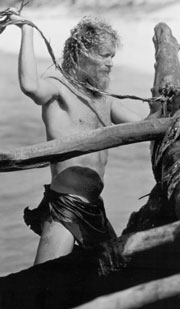THE TRAILER TELLS you everything you need to know about Cast Away (man gets stranded on island, struggles to survive), at least in terms of its principal dramatic question. Which is, does Tom Hanks get back home? We know he does because we’ve seen him clean shaven and slimmed down on TV, very much alive. Having unwisely divulged that point, Forrest Gump director Robert Zemeckis and Hanks—the film’s producer—are left with plot point B: Does he ever get back to his girlfriend (Helen Hunt)?
CAST AWAY
directed by Robert Zemeckis with Tom Hanks, Helen Hunt, and a volleyball opens December 22 at Meridian, Metro, Northgate, and others
That answer is a long time in coming. Cast Away spends the first 40 minutes of its almost two-and-a-half hours sketching the character of its protagonist, Chuck, in thoroughly modern colors. He brandishes a cell phone and pager; he thinks and talks fast; he’s clever and resourceful, good with his hands; and he solves problems easily in his job with FedEx. (The company receives the largest, longest, and most favorable product placement in motion-picture history.) Chuck’s a doer, a go-to guy, immediately likeable because, well, he’s played by Tom Hanks—despite signs he’s too driven, too time-obsessed, maybe even a bit of a prick.
What’s the appeal for Kelly, Helen Hunt’s character? She’s pursuing some kind of advanced degree and could have any guy she wants. She should be smart enough to sort out the good from the bad. Chuck’s crazy about her, but work comes first (an alarm bell, if ever one sounded). Kelly may not protest too much, but we do. This guy is headed for a fall.
The proud man brought down is a theme of tragedy, of course, but it takes the elements, not a woman, to humble Chuck. Again, you’ve seen the trailer, so you know our storm-tossed hero is marooned on an island, where he spends the next solitary hour of Cast Away.
WHAT HAPPENS NEXT is a credit to Hanks’ star power in two senses. First, he doesn’t embarrass himself in any way as an actor. Beyond the skid row beard, weight gain and loss (yawn), and yearlong hiatus in the movie’s production, the man holds your attention and generally resists the tendency to overplay Chuck’s loneliness and desperation. Yes, he delivers all his midfilm dialogue to a volleyball (Wilson), and, yes, it’s a stupid plot device. (Like normal people don’t talk to themselves?) Still, Hanks acquits himself well.
Second, Cast Away never would’ve been—never should’ve been—made were it not for Hanks’ Hollywood clout. It’s a profoundly boring, unnecessary picture. Lavishly shot, handsomely mounted, well acted and cast, the movie tries to make an epic out of one man’s spiritual transformation, which could’ve been accomplished far more entertainingly (and far less obviously) in New York.
The movie can be seen as a parable of modern life, since all of us are just as much clock-watchers as Chuck. Yet times have changed since 1719 when Robinson Crusoe was a best-seller. That novel brims with plot and incident; by contrast, Cast Away‘s focus on Chuck’s inner life is admirable but dull. Like Crusoe, he’s a man reborn and reinvented, and we share in the satisfaction of his accomplishments. After 1,500 days have passed, Hanks ably conveys the rueful self-awareness of a man who knows how his old priorities were wrong, who wants only a second chance to right them.
Problem is such trite realizations don’t require a desert island to attain. Rummaging through the FedEx boxes that wash up on the beach after the harrowing plane crash, Chuck opens a gift card. “The most beautiful thing in the world is, of course, the world itself,” reads the aphorism inside. None of Cast Away‘s writing exceeds that sort of Hallmark-level mediocrity, and the film’s best moments are generally (appropriately) wordless. The best that can be said of Cast Away is you share Chuck’s relief when his journey is over.








